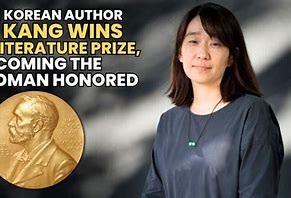
There are at least three surprises in this year’s Nobel Prize for literature. The first is that Korea has finally broken the mold and joined the ranks of countries that produced quality writers with the rank and standard of the Nobel Prize. With its small population and rising economic power, Korea was never expected to produce a writer with enough caliber to win the Nobel Prize. This is indeed the big surprise. South Korea is now emerging as a new literary powerhouse. The Nobel Prize is often noted for its unexpected outcomes as least expected authors sometimes emerge to claim the mantle while long-expected ones continue to be the annual losers.
Indian-British author Salman Rushdie is a good example. He was expected to win the Nobel a long time ago. Yet, the fatwa or the denunciation and the ban imposed on him by the Iranian government as far back in the 1980s for his groundbreaking novel entitled “The Satanic Verses,” has kept his hopes dashed for a record time. Rushdie failed to win the Nobel not because his work was literarily outstanding or unprecedented but because of its political content, or his criticism of Islam, that was unacceptable or blasphemous by Iranian authorities who saw in him a renegade Muslim who sold his allegiances to the West.
There are also a number of writers who missed the Nobel Prize while they were expected to win it earlier in their careers. British writer Graham Green is one of them. Although literary critics and publishers expected him to win the prize, one of the key members of the Nobel committee, that is to say the committee that decides who should win the prize, was reported as saying that, “Green would win the Nobel on his dead body”. The source or reason for this kind of absurd opposition was never reported and the famed author never received it.
There have been a number of surprise winners in the history of the Nobel Prize for Literature. French writer Albert Camus won the Nobel Prize in 1957. “Camus was reportedly shocked to receive the news of his Nobel Prize while dining with his girlfriend. He initially felt the prize should go to one of his friends who was also a writer. Another French philosopher and writer was also surprised by his win. “Sartre declined the Nobel prize by saying that he always refused official distinctions and did not want to be institutionalized.”
The German writer Hera Muller won the prize in 2004. “Many were surprised even dismayed by the awarding of the Nobel Prize to Herta Muller”.
Usually, Nobel laureates emerge from countries with a highly developed literary tradition. Europe and the United States, or the English-speaking world, have almost had a monopoly of Nobel Prize wins. The second surprise is that this year’s winner is a woman. In the long history of the Nobel Prize for literature, there were a few women who were honored with this accolade. Writing was long considered an exclusively male-dominated career or occupation. The third and final surprise might be that this year’s winner is largely unknown to the literary world because she is writing in the Korean language and foreign readers know her in English translations.
Another surprise about the Nobel Prize in literature is that since its inception in 1901, only 18 women have been recognized, including Selma Lagerlöf (1909), Grazia Deledda (1926), Sigrid Undset (1928), Nelly Sachs (1966), Doris Lessing (2007) and more recently Louise Glück. Hang Kang is therefore the 19th recipient of the prize last year.
Last year’s (2024) winner of the prestigious Nobel Prize in literature comes from South Korea. This is, however, the first time that the Prize has gone to a relative stranger to the literary world. When Abdulrazak Gunar, a little-known writer from Zanzibar, entered the literary world, it welcomed him with wonder and shock, not because he is an African but because of the relative obscurity or anonymity in which he was kept for a long time. Usually, talented writers first seek fame and not fortune. They work hard to establish themselves in the literary world or attract the attention of influential literary critics or book reviewers who are expected to catapult them to fame.
With fame comes fortune as publishers start to compete for new titles by newly melted authors. Basically, money is not an important factor in the careers of many authors. It is not love of money that inspires these writers. Talent, inspiration and hard work are rather the most important driving factors. Writing is not a career or a calling that one can do for making money.
Writing is perhaps one of the most demanding branches of the arts, where success is a matter of more hard work than commercial acumen. One cannot become a rich author by chance. One has to sweat all their life for it. Writers are rather famous for leading austere lives and most of them become famous or rich in their twilight years. Not all professional writers are as rich or as famous as Stephen King or Paulo Coelho, earning six-digit royalties on every title they publish.
However, there are a few surprises in between. Han Kang, this year’s winner of the Nobel for literature, is a name hardly known outside South Korea. It is often assumed that big countries with big populations have better opportunities to produce high-caliber writers and artists as well as sportsmen. This observation may sound relevant when we see that global literary or artistic success is mostly centered around Europe, America, sometimes Africa and India. By winning the 2024 prize, South Korea has proved that literary genius can sometimes be born in a small country with a high literacy rate and technological advancement. This is indeed a paradigm shift in the history of the Nobel Prize.
A brief biography of the writer in Wikipedia indicates that Han Kang is a 52 years old South Korean writer who, from 2007 to 2018 taught creative writing at the Seoul Institute of the Arts. Han rose to international prominence for her author, entitled “The Vegetarian.” The book subsequently became the first Korean-language novel to win the International Booker Prize for fiction in 2016. In 2024, she was awarded the Nobel Prize for literature, as first for an Asian woman and a Korean.
The main landmarks in Han Kang’s literary evolution are her stint in journalism as a reporter for a monthly arts magazine. Her literary career began the same year when she started to publish her poems in the winter issue of the magazine back in 1993. Her first short story, entitled “The Scarlet Anchor,” was published the same year, with her first collection of short stories published in 1995. Since then, Han’s literary career grew by leaps and bounds and she won more than 10 international literary prizes before clutching the Nobel, the most prestigious of them all. The citation of the Nobel Prize for “The Vegetarian” commended Han Kang “for the intense poetic prose that confronts historical traumas and exposes the fragility of human life.”
Hang Kang may be a surprise winner of the Nobel Prize for literature simply because no woman has won it before her. She is not only the first woman but also the first woman from South Korea that has never won the prize in its rather short history of more than 70 years. Hang deserves the prize given the vastness of her works and the diversity of the artistic genres in which she amply demonstrated her talents. Hang is not only a novelist. She is a poet, a musician, a cinematographer, and a short story writer.
One of the advantages of winning the Nobel Prize is the recognition, popularity and money that it brings to the winner. Since Hang Kang’s win last year, millions of copies of her books have been published and are circulating among the Korean-speaking population, while translations are also expected to enjoy worldwide distribution that will certainly bring a lot of money to the author. Hang Kang has become a literary phenomenon and she will certainly inspire many women writers both in her country and worldwide. Africa also has a young and famous writer by the name of Chimamanda Ngozi Adichie, a Nigerian writer in her thirties who has shaken the literary world while she was still in her twenties. When will an Ethiopian female writer win the Nobel? No one knows for sure, but when it happens, it will certainly be ranked as the biggest surprise of its time. Let us not forget that we live in an age of big dreams and big surprises.
BY MULUGETA GUDETA
THE ETHIOPIAN HERALD SATURDAY 15 MARCH 2025


